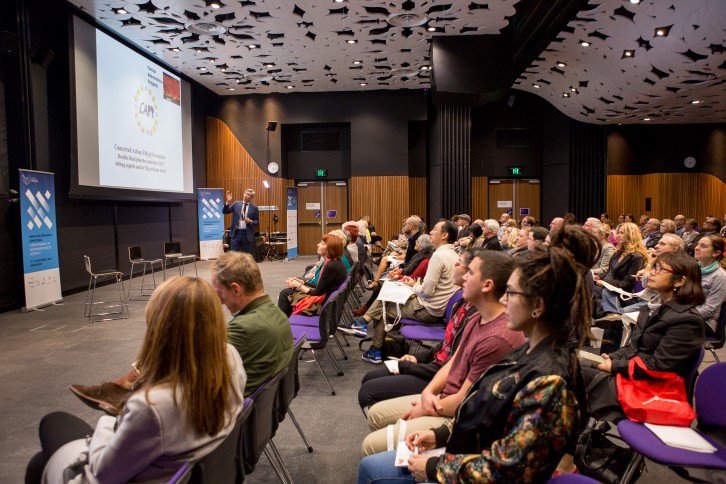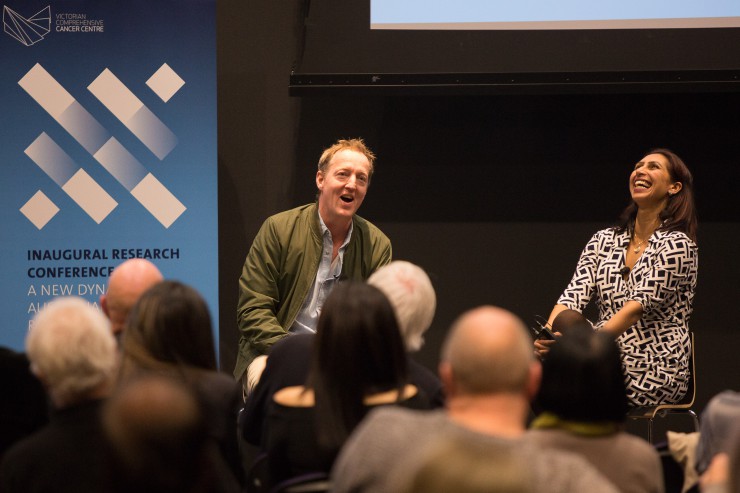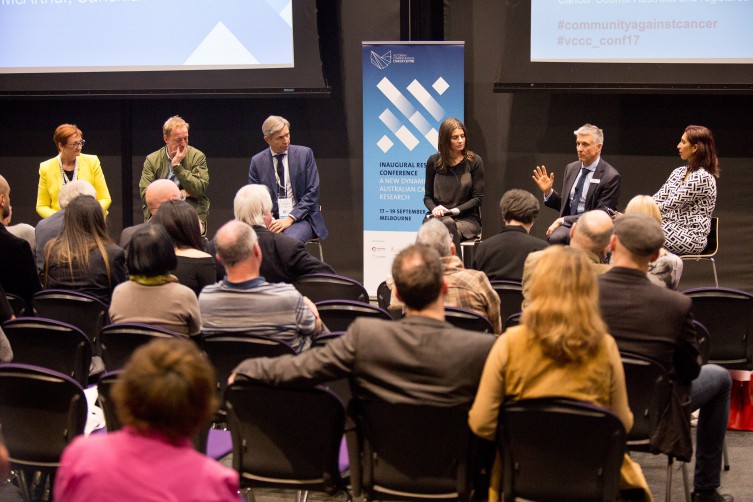






With incidence continuing to rise, cancer will touch the lives of most Australians. Our response to this growing problem is strengthened by coming together as a community to share knowledge and experiences that could help us overcome this often devastating disease.
It was this desire to share experience and knowledge that inspired the Victorian Comprehensive Cancer Centre’s first public forum, ‘Building a Community Against Cancer’. Held on the evening of Monday 18 September, 2017, the event was a feature of the VCCC’s Inaugural Research Conference – a major, international scientific meeting.
Community representatives came together with by renowned doctors from Australia and the UK to learn, share and discuss personal experiences, current trends in cancer prevention, care, treatment and research, and how we can all play a part in shaping the way forward.
After a welcome from MC Sally Cockburn, also known as Dr Feelgood from 3AW’s Talking Health, who touched on how far cancer awareness and treatment has come during her career, the forum kicked off with the science behind some current attempts to prevent cancer.
Renowned clinical geneticist Prof Sir John Burn from Newcastle University in the UK, gave a fascinating explanation of his work to prevent cancer in people with an inherited condition called Lynch syndrome. His research focuses on using a cheap and readily available drug: aspirin.
John started by telling us about the discovery of Lynch Syndrome, in part thanks to a Scottish sheep farmer called Ted and his family history of cancer. This discovery combined with previous observations that aspirin might reduce the risk of bowel cancer, sparked the idea for a trial called the Cancer Prevention Programme (CAPP2), investigating whether aspiring prevented cancer in people with Lynch Syndrome.
After 10 years of follow up, the CAPP2 trial showed that people with Lynch Syndrome taking two aspirin tablets a day (600mg total), for at least 2 years, had 50 per cent fewer cancers than people taking placebo pills. Excitingly more positive results from CAPP2 are coming out soon from longer-term follow up of the trial.
Following this success, John Burn’s team have now launched the international CAPP3 trial to work out the best dose of aspirin to give people. Anyone with Lynch Syndrome can take part – details are on the CAPP3 website.
Because the same genetic fault behind Lynch syndrome is found in 1 in 6 of all cancers, John Burn hopes that we can build a broader cancer prevention program using this knowledge.
VCCC Executive Director, Prof Grant McArthur, termed this kind of precision prevention, which targets prevention based on people’s genetics or other factors – a “holy grail for our health systems”. This is why precision prevention is a key focus for the VCCC’s prevention research plans.

John Burn explains the Cancer Prevention Program
John was followed by some very open and frank discussions with cancer “thriver” Justin McLean, and Sam Ludbey-Stynes, widow of champion footballer Jim Stynes and a director of The Jim Stynes Foundation.
Justin McLean spoke with Dr Ranjana Srivastava, a consultant oncologist and award-winning writer, about his experience of cancer diagnosis – he still remembers the exact time, 4.28pm - and his process of using his business experience to find the best care team possible.
From his experience, Justin has developed an online patient-support program and app called thrivor.com. The name came about as Justin explained he came to despise the word survivor with its binary connotations and so decided to think of himself as a thriver instead. As he put it, “regardless of your scenario or prognosis you should be entitled to thrive”.
Launched earlier this year, Thrivor is designed to strengthen support networks for cancer patients and others with chronic illnesses. The app gives supporters access to a patient’s everyday tasks so that people can more easily offer to help where and when they can, with anything from walking the dog to transport and childcare.

Justin and Ranjana in conversation
Sam Ludbey-Stynes then took the audience through some of the experiences of treatment that she helped her late husband Jim Stynes to face in his determination to “fight, fight and fight it”. This included two innovative clinical trials that Jim participated in.
In her conversation with Prof Grant McArthur - who was Jim’s consultant - Sam also spoke about Jim’s willingness to try some pretty extreme alternative treatments overseas, that she wasn’t always comfortable with. She believed firmly that patients should do what they can to maintain a good quality of life but that when considering risky, alternative treatments, encouraged people to educate themselves as much a possible.
Bringing together many streams of the evening, the night finished with a lively panel session, including important questions from the audience to our community members, doctors and Prof Sanchia Aranda, CEO of Council Cancer Australia and registered nurse. Topics ranged from prevention with vaccines to improved access to clinical trials with tele-oncology, to how picking up cancer in the blood could be an option for earlier diagnosis.

Our speakers answer questions from the audience
If you missed out or want a reminder of the evening you can now watch the recording of the event.
To read more about the VCCC Inaugural Research Conference, check out our article or watch our video on highlights from the three-day meeting.
To hear about other VCCC events, including public events, sign up to our mailing list via our contact form (please read and tick the box on our contact page to access form).
To get involved in shaping patient experience in your hospitals, talk to your care team about local consumer groups.
